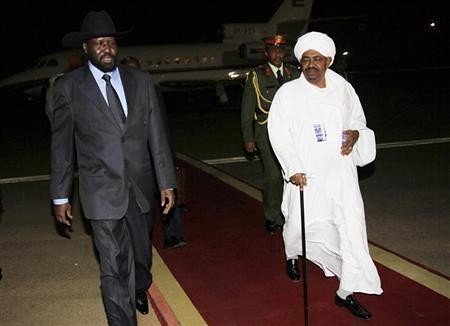
Silva Kir, the leader of south Sudan and President Omar al-Bashir of Sudan. The President said he would recognize the south if it voted for separation from the central government. Factional fighting in the south may jeopardize their independence., a photo by Pan-African News Wire File Photos on Flickr.
Posted on Monday, 16 April 2012 11:13
Egypt steps in to prevent an all-out Sudan war
By Konye Obaji Ori
African Report
Sudanese planes dropped bombs on a market in South Sudan, and attacked troops in the oil-producing Heglig oil region, beating the drums of an all-out war. But Egypt plans to intervene.
AU's Peace and Security Council says South Sudan's occupation of Heglig as
The Sunday bombings on South Sudan have been described by some analysts as a retaliatory attack by Sudan after its neighbour seized the Heglig oil field on April 10.
South Sudan took over the oil field, which accounts for about half of Sudan's 115,000 barrel-a-day oil output. The African Union's Peace and Security Council described South Sudan's occupation of Heglig as "illegal and unacceptable."
Reports say it was likely there will be further clashes as the tensions draw dangerously close to an all-out war.
On April 12, the UN Security Council called for an "immediate" ceasefire and expressed "deep and growing alarm at the escalating conflict". The following day ground fighting 30 kilomters north of Heglig erupted between troops from the two neighbours.
The fighting has stopped oil production in Heglig.
On April 14, Sudanese soldiers were reported to be about a few kilometers from the Heglig oilfield. But South Sudanese soldiers claimed to have pushed Sudanese troops back to Karasana, north of Heglig.
After Sunday's aerial bombardment of South Sudan by its northern neighbour, the international community remains wary of a wider war between the Sudans, and Egypt has stepped in to play mediator in the crisis.
Egyptian Foreign Minister Mohammed Kamel Amr met Sudan's President Omar al-Bashir on Sunday and delivered a message from Egypt's military ruler, Field Marshal Hussein Tantawi.
"I came here to listen to the Sudanese vision about the crisis and tomorrow I'm going to Juba to listen to South Sudan," Kamel Amr told journalists.
"Then we can create a proposal for mediation to solve the crisis if the two parties agree to that."
The South seceded nine months ago in a deal that ended decades of civil war, but oil seem to be top of the list of disputes rocking both countries.
The latest hostilities are the worst since South Sudan's independence from Sudan last July under a 2005 peace accord, and have raised fears of a return to outright war.
No comments:
Post a Comment